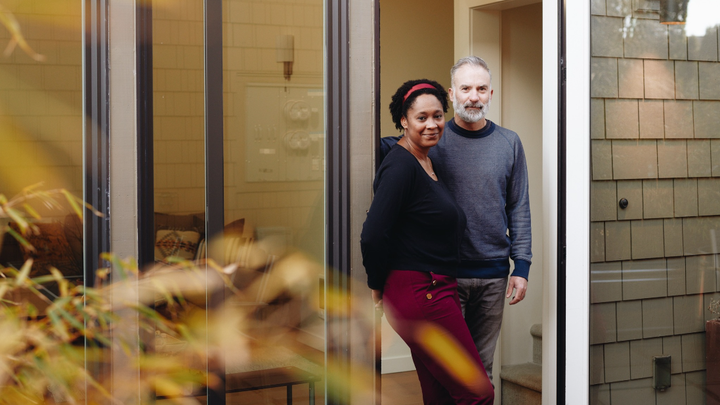Как можете да подкрепите спешните престои по време на криза
Когато природни бедствия или мащабни конфликти принуждават хората да напуснат домовете си, една от най-спешните им нужди е намирането на място за престой. Жилищата за краткосрочно настаняване им дават възможност да се съсредоточат върху други приоритети и да правят по-дългосрочни планове. Можете да окажете съдействие, като предоставяте места за престой при спешни случаи или да дарявате на Airbnb.org.
Какво представлява Airbnb.org?
Airbnb.org е организация с нестопанска цел, регистрирана съгласно раздел 501(c)(3) от Данъчния кодекс на САЩ, която работи независимо от Airbnb. Дейността започва през 2012 г., когато Шел, домакин в Бруклин, Ню Йорк, предлага мястото си безплатно на евакуираните след преминаването на урагана Санди. Airbnb поиска подкрепа от други хора в общността и над 1000 местни домакини отвориха домовете си за хора, засегнати от бурята.
Вдъхновени от действията на Шел, в Airbnb разработиха програма, която дава възможност на домакините по целия свят да предлагат местата си по време на криза. През 2020 г. тази програма се превърна в Airbnb.org – организация с нестопанска цел със собствена мисия и управителен съвет.
Днес Airbnb.org работи с правителства, неправителствени и хуманитарни организации по целия свят, за да осигури на хората временни места за престой. Финансираната от дарители организация използва технологичната платформа на Airbnb и глобалната общност от домакини, за да реагира на природни бедствия, конфликти и други извънредни ситуации.
От 2012 г. насам Airbnb и Airbnb.org са свързали близо 300 000 души с места за престой при спешни случаи, включително бежанци от Украйна и хора, разселени от земетресенията в Турция и Сирия. През последните три години повече от 91 000 домакини в 189 държави са се регистрирали за настаняване на гости. Нуждата от подкрепа продължава да расте.
Как мога да даря на Airbnb.org?
Можете да направите еднократно дарение, независимо дали имате място за настаняване на гости. Ако настанявате гости редовно чрез Airbnb, можете да дадете определен процент от всяко изплащане. И в двата случая 100% от дарението ви отиват за финансиране на престои при спешни случаи (а не за оперативни разходи на Airbnb.org).
Как мога да стана домакин в Airbnb.org?
Ако сте домакин в Airbnb, можете да използвате текуща обява или да създадете нова за друго място за престой. Имате възможност да предложите мястото си за настаняване безплатно или с отстъпка чрез Airbnb.org.
Можете също така да се регистрирате, за да настанявате гости изключително чрез Airbnb.org, което означава, че ще настанявате гости само за престои при спешни случаи. В този случай можете да предлагате мястото си само безплатно.
Гостите на Airbnb.org не плащат за престоя си. Резервациите се финансират от дарения. Като предлагате мястото си за настаняване безплатно или с отстъпка, можете да помогнете даренията да стигнат по-далеч и да осигурите на повече хора места за престой при спешни случаи.
Airbnb се отказва от всички такси за услугата си за престои чрез Airbnb.org. Резервациите са защитени от AirCover за домакините.
Кои са гостите на Airbnb.org?
Гостите на Airbnb.org често са препоръчвани или подкрепяни от организации, специализирани в реагиране при кризи и преселване на бежанци. Гостите не могат директно да кандидатстват за място за престой при спешни случаи чрез Airbnb.org.
Гостите, които отговарят на условията за престои при спешни случаи, включват:
Хора, засегнати от големи бедствия, и хуманитарни работници, които реагират на тези бедствия в качеството си на длъжностни лица.
Бежанци или хора, търсещи убежище, специална имигрантска виза или друг имиграционен статут с подобна хуманитарна цел.
Отговарящите на условията гости могат да получат кредит от Airbnb.org, за да резервират място за престой при спешни случаи, или партньор с нестопанска цел може да резервира от името на гостите и да управлява комуникацията с домакина.
Вашето място за настаняване може да осигури комфорт на хора по време на криза. Дима, гост на Airbnb.org в Берлин, напуска Украйна през 2022 г. „Изпитвах такива емоции през първите дни“, казва Дима. „Дори не знам кое беше по-важно за мен – да бъда на безопасно място или просто да осъзная огромната подкрепа, която получавам“.
Ще знаят ли гостите, че съм поддръжник на Airbnb.org?
Да. Като се регистрирате, за да предлагате места за престой при спешни случаи безплатно или с отстъпка, или като настроите периодични дарения от изплащанията, ще получите значка за поддръжник на Airbnb.org в профила си на домакин.
Милиони хора по света са напуснали домовете си поради конфликти и бедствия. Можете да окажете значително влияние върху живота на бежанци, евакуирани хора и хуманитарни работници, като отворите дома си или направите дарение, за да подкрепите престоите при спешни случаи.
